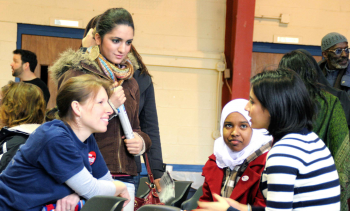
- Refugee Resettlement. The initiative conducts research and delivers technical assistance to strengthen refugee resettlement services, with particular attention to underserved groups such as women, children and youth, and individuals with disabilities. The initiative engages in comparative studies to identify promising models that suit refugee resettlement in different national or regional contexts.
- Unaccompanied Children. MPI analyzes policies and programs that affect unaccompanied minors while they are in government custody, transitioning to local communities, or re-entering their countries of origin. The initiative engages providers, governments, community-based organizations, and others to improve services to these children based on child development and child welfare principles.
- Access to Benefits and Services. The initiative examines the legal and policy frameworks set by governments to determine immigrants’ eligibility for public benefits and services such as Medicaid and the Supplemental Nutrition Assistance Program. It also focuses attention on systemic challenges in connecting asylees, children of immigrants and other eligible groups to available benefits and services.












A Solvable Challenge: Improving Asylee Access to Health and Other Benefits